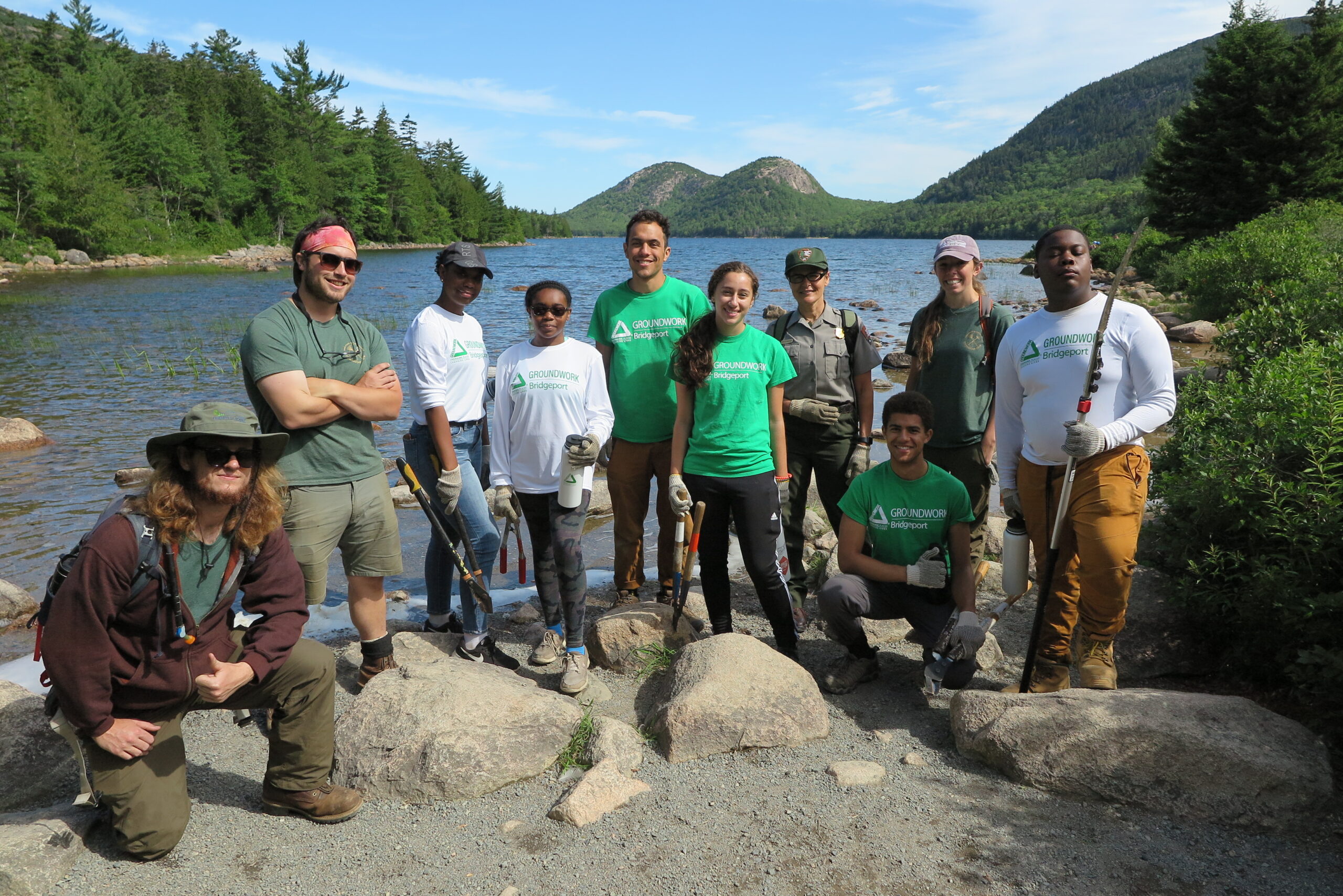Helping to Make Acadia
More Welcoming & Accessible
Friends of Acadia finds it critically important to ensure that all Americans have access to one of our nations’ most beloved parks, Acadia National Park.
Friends of Acadia finds it critically important to ensure that all Americans have access to one of our nations’ most beloved parks, Acadia National Park.
We know that visiting a national park can be challenging, and we help lower barriers to better welcome communities from all backgrounds.
We know this work must be intentional, relationship-based, and co-created with the groups that we hope to engage with year-after-year.
Friends of Acadia will continue to expand welcoming and accessible visitor experiences to all communities exploring Acadia National Park, some for the first time, and hopefully, for many repeat visits.

Groundwork Bridgeport team members pose for a photo a Jordan Pond in Acadia National Park. (Photo by Nathaniel X. Boechat/Friends of Acadia)
Friends of Acadia began partnering with Park Journeys in 2017 to bring urban youth organizations to Acadia National Park. These youth are participants of strong community programs that create a range of cultural and outdoor experiences that build upon each other.
Youth begin by visiting local parks, then state parks, and finally a national park such as Yellowstone or Acadia over the course of a season or full year. Once youth return home, they share their experience with the community through art, music, presentation, mentorship, and more. Park Journeys groups travel to Acadia from Ohio and North Carolina with financial assistance from Friends of Acadia. Both groups spend a week in Acadia exploring, learning, and happily expanding their horizons.
Since 2019, Friends of Acadia awarded this grant to another organization, Groundwork Bridgeport of Connecticut. This group focuses on environmental stewardship youth projects in their local community, so their well-trained youth readily dug into trail work projects while visiting Acadia National Park.
The group also takes time to enjoy the park via hiking, biking, kayaking, etc. Most of the youth from both organizations have never traveled far from home before, camped out, or visited a national park. We hope many of these students return with their families and friends in the future.
To learn more about Acadia for All Grants, please contact us.
Friends of Acadia has been working in partnership with Acadia National Park to improve accessibility so that all can enjoy its many benefits.
Whenever possible, Acadia National Park strives to make its facilities and programs accessible to visitors of all abilities. Visitors can find guidance on Acadia National Park’s website about facilities, trails, and areas accessible to people with limited physical mobility, as well as information to assist visitors with hearing impairments or blindness/low vision. Service animals on leashes are also allowed in all park facilities and trails, except those that are especially steep or that have iron rungs.
Despite the park’s best efforts, however, there are still popular visitor destinations, such as Sand Beach, where accessibility improvements will be challenging. To learn more about accessibility at Acadia National Park explore here.
A wheelchair accessible carriage is available for Acadia National Park tours.
Read MoreMDI Wheelers helps people unable to ride a bike get out on Acadia’s carriage roads.
Read MoreWith funding from the Diana Davis Spencer Foundation, Friends of Acadia underwrote the work of the National Center on Accessibility at the Eppley Institute for Parks and Public Lands at Indiana University to prepare an accessibility assessment of selected sites in the park.
The purpose of the assessment was to raise awareness among all park staff about fostering access for all visitors. Consultants studied 28 sites in the park and made recommendations for improvements. Additionally, they recommended that Acadia’s website be updated with more detailed descriptions of park features so that visitors could decide for themselves what is accessible to them. Acadia National Park will incorporate the study’s recommended improvements into future infrastructure projects.